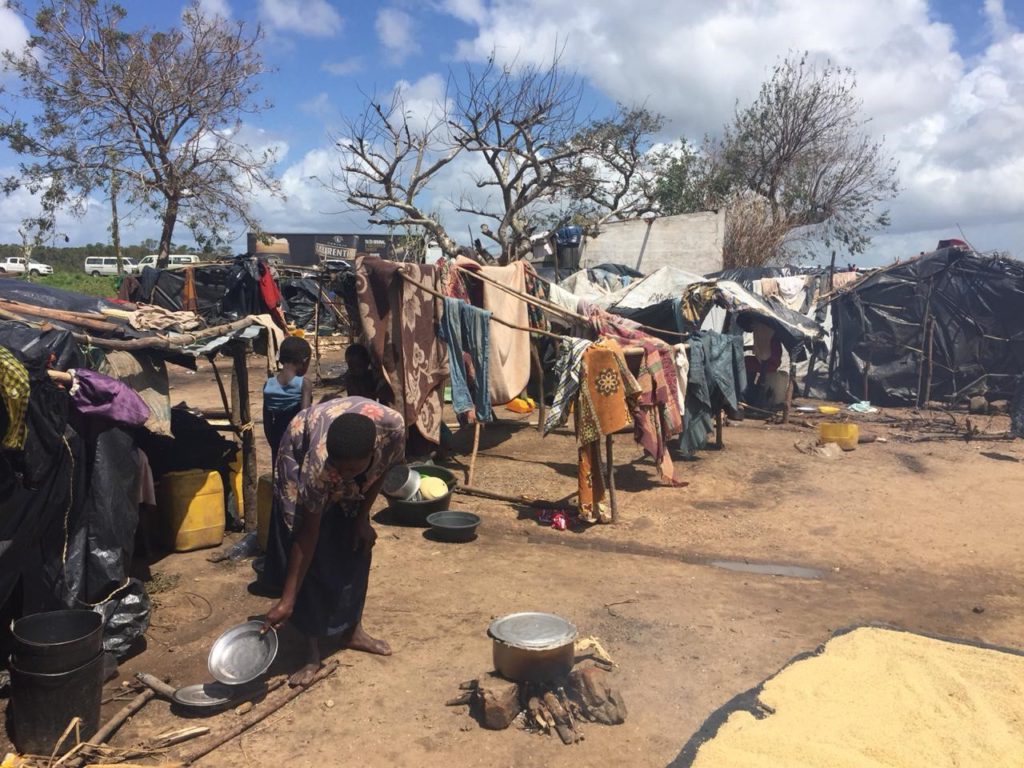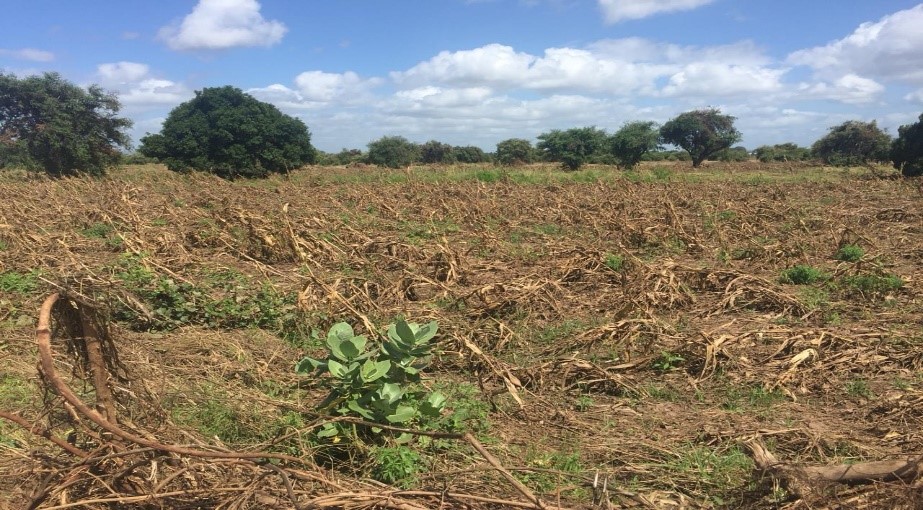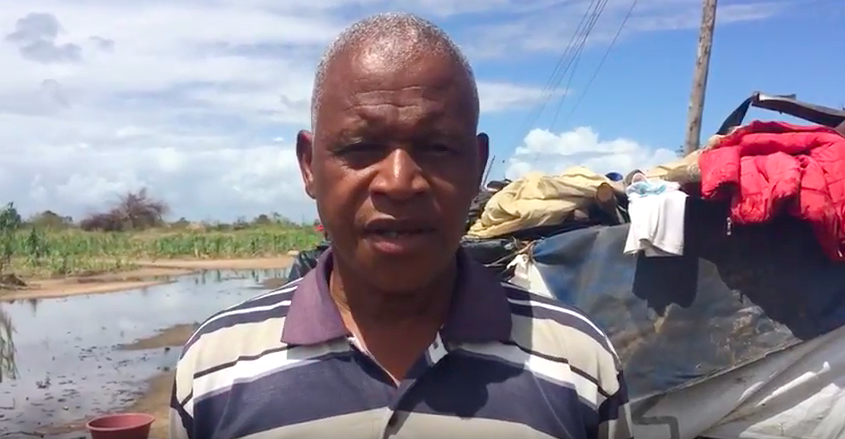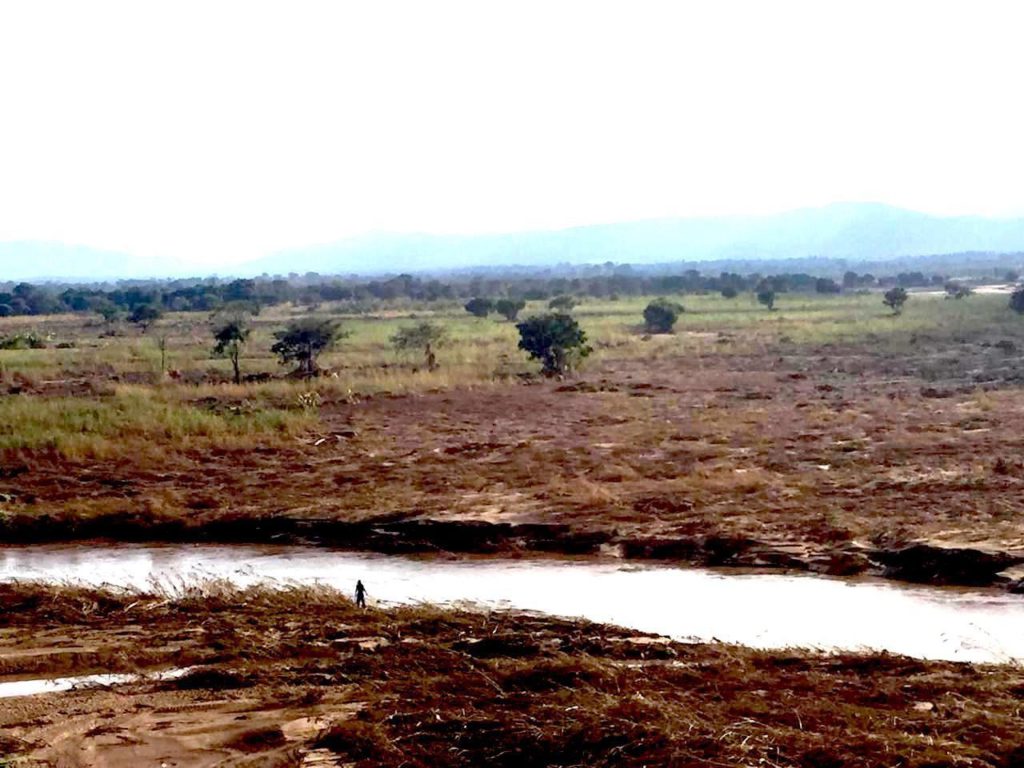Your cooperation is needed to help farmers rebuild their livelihood in response to their voices
[Translated by M. Kanai/S. Altman]
The worst cyclone damage in history in the Southern Hemisphere

People forced to flee from home and live in evacuation camp due to flooding.
In mid-March, Tropical Cyclone Idai hit southern Africa with full force. Three countries namely Mozambique, Zimbabwe and Malawi suffered great damages such as destruction of infrastructure and houses. The United Nations World Food Program (WFP) has designated the scale and urgency of the crisis as Level 3 which is equal to that of Syria and South Sudan both of which are respectively under conflict.
More than 90 percent of some 2 million people affected by the cyclone are said to be Mozambicans.
Most of the inhabitants are farmers, there’s enormous damage to their crops, and urgent assistance is needed for resuming agriculture.

Cropland died off due to flood disaster.
The main industry in Mozambique is agriculture. The tropical cyclone hit the country on the eve of crop harvest season. Agricultural production was immensely damaged since planted crops were swept away together with topsoil. Seeds and farm tools were also lost. This arises a serious concern over a mid to long-term shortage of food and nutrition.
In June, the dry season starts making it difficult for farmers to carry out agricultural work. JVC will extend emergency assistance through the provision of seeds and farm tools to enable them to immediately resume production after coming home from evacuation shelters in order to revive their life and livelihood.
Voices from the disaster area regarding the acute and grave situation

“The tropical cyclone brought a devastating blow to our region. A number of houses were flattened leaving many people injured and some dead. Furthermore, the ensuing inundation after the attack of the cyclone aggravated the already difficult situation resulting in the rise in the number of fatalities. Agricultural production suffered great damage, too. We were hit hard by the cyclone while we were drying maize. All the 110,000-hectare planted areas were wiped out. We are really in a serious situation.”
Severely damaged farm lands

A plentiful harvest was expected on these lands. However, all the crops were flooded and died off or up-rooted and swept away.
JVC will start emergency assistance in order to help the people of Mozambique faced with this crisis. Your donation will be utilized to provide 200 local households with urgently needed native breeds of high-nutrition vegetable seeds, farm tools and support for rehabilitation of damaged lands.
Your donation is needed to help farmers to live normal lives again.
Our plan of assistance activities
- Target area and its current situation: Nhamatanda County, Sofala Province
This is one of the hardest-hit areas by the cyclone. Furthermore, 111,210-hectare farming areas were ruined due to flooding caused by a dam failure. 1,000 tons of seeds are urgently needed. - Target population: 200 households (1,000 people)
200 of the most vulnerable households of smallholder farmers are to be selected. -
Activities to be implemented
a) Selection of 200 target households for assistance.
b) Distribution of farm tools (hoe) for land cultivation.
c) Distribution of maize and vegetable seeds. As for seeds, native varieties which are adaptable to local conditions and early-maturing breeds are to be selected.
d) Technical support for field cultivation and sowing.
e) Monitoring and report writing. - Expected duration of activities: 2 months (From early April to early June 2019 )
The duration of the activities is subject to extension depending on the damage situation of the area and the status of funding.
YOU CAN MAKE A DONATION FROM THIS LINK.
Message from Watanabe in charge of the activities of JVC in Mozambique
To date, JVC has been making requests to those concerned regarding a planned large-scale agricultural development project in Mozambique, which is led by the Japanese government, to heed the appeal of local farmers to identify their needs and requirement first if the project is meant for assistance. An assistance project which is ill-suited to the current situation of the region is likely to have a detrimental impact in the end.
Before the disaster hit, farmers conserved their natural environments such as land, water, forests, and seeds with good care, as they brought blessings to their lives. Seeds (native varieties) preserved and protected in the region throughout generations were harvested by farmers to be used in the following year. Every farmer would endeavor to improve their seeds so as to be suitable to the environment and they could increase the variety of species by exchanging seeds with other. In this manner, every year smallholder farmers used to think and decide themselves what and when to plant. They nurtured food and had the pleasure of tasting them and in this way, continued to make their living. Through this process, farmers protected their regional foods (culture) and communities thereby sustaining pride in the way they carried out farming.
However, in the event of the current emergency, some goods put into relief supplies could exert adverse effect on the affected regions. For example, some foods foreign to the local dietary habit or the kind of seeds such as F1hybrids (first filial generation) which are different from what local farmers wanted to preserve are brought in large quantities. F1hybrids, unlike heirloom plants, do not leave seeds for the next generation, therefore, farmers must continue to purchase seeds. As aforementioned, it is possible that farmers are forced to change their lives and livelihood against their wishes in the years that follow, even though such assistance may help them go through a difficult phase. We need your cooperation to help local farmers to get back on their feet and restore normal life.
Share This: